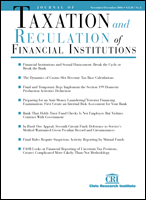An Inquiry Into Mutual Fund Market Timing—Two Years Post-Canary
Author: Michael A. Collora.
Source: Volume 19, Number 03, January/February 2006 , pp.5-13(9)

next article > |return to table of contents
Abstract:
A court filing on September 3, 2003 was a watershed event for the regulation of mutual fund trading and sales practices. On that day, New York Attorney General Eliot Spitzer filed a civil complaint in New York Supreme Court alleging a litany of market timing and late trading arrangements with dozens of mutual fund distribution companies by a hedge fund, Canary Capital Partners, and its principal, Edward J. Stern, scion of the Hartz Pet food fortune. Among the companies mentioned in the complaint as having complicit arrangements with Canary, were large mutual fund complexes at Bank One, Janus Capital Corporation, and Strong Capital, as well as small brokerage houses, (JB Oxford and Kaplan & Co.), and Securities Trust Company, an Arizona trust administrator—all of whom assisted in late trading and timing agreements with Canary, among others. However, the complaint primarily focused on Banc of America Securities, its Vice President, Theodore C. Sihpol, III, and the Nations Bank fund complex, for arranging capacity for timing and permitting late trading for Canary. Fund companies have paid billions in fines and restitution, changed their sales and pricing practices, reduced fees, recombined or shut down and reinstituted boards of directors.Keywords:
Affiliations:
1: Dwyer & Collora LLP.